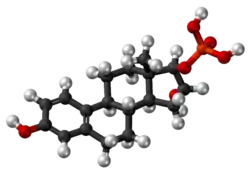Estriol phosphate
Estriol phosphate (E3P), or estriol 17β-phosphate, also known as estra-1,3,5(10)-triene-3,16α,17β-triol 17β-(dihydrogen phosphate), is an estrogen which was never marketed. It is an estrogen ester, specifically an ester of estriol with phosphoric acid, and acts as a prodrug of estriol by cleavage via phosphatase enzymes in the body. Estriol phosphate is contained within the chemical structure of polyestriol phosphate (a polymer of estriol phosphate), and this medication has been marketed for medical use (brand names Gynäsan, Klimadurin, Triodurin).[1][2][3][4][5][6][7][8][9][10]
 | |
 | |
| Clinical data | |
|---|---|
| Other names | E3P; Estriol 17β-phosphate; Estra-1,3,5(10)-triene-3,16α,17β-triol 17β-(dihydrogen phosphate); 3,16α-Diydroxyestra-1,3,5(10)-trien-17β-yl phosphate |
| Drug class | Estrogen; Estrogen ester |
| Identifiers | |
| |
| CAS Number | |
| UNII | |
| Chemical and physical data | |
| Formula | C18H25O6P |
| Molar mass | 368.366 g·mol−1 |
| 3D model (JSmol) | |
| |
| |
References
- Lauritzen C, Velibese S (September 1961). "Clinical investigations of a long-acting oestriol (polyoestriol phosphate)". Acta Endocrinol. 38 (1): 73–87. doi:10.1530/acta.0.0380073. PMID 13759555.
- Bachmann FF (January 1971). "Behandlung klimakterisher Beschwerden mit Polyöstriolphosphat" [Treatment of menopausal complants with polyoestriol-phosphate. Experiences with Gynäsan injections]. Munch Med Wochenschr (in German). 113 (5): 166–9. PMID 5107471.
- A. Labhart (6 December 2012). Clinical Endocrinology: Theory and Practice. Springer Science & Business Media. pp. 551–. ISBN 978-3-642-96158-8.
The polymer of estradiol or estriol and phosphoric acid has an excellent depot action when given intramuscularly (polyestriol phosphate or polyestradiol phosphate) (Table 16). Phosphoric acid combines with the estrogen molecule at C3 and C17 to form a macromolecule. The compound is stored in the liver and spleen where the estrogen is steadily released by splitting off of the phosphate portion due to the action of alkaline phosphatase. [...] Conjugated estrogens and polyestriol and estradiol phosphate can also be given intravenously in an aqueous solution. Intravenous administration of ovarian hormones offers no advantages, however, and therefore has no practical significance. [...] The following duarations of action have been obtained with a single administration (WlED, 1954; LAURITZEN, 1968): [...] 50 mg polyestradiol phosphate ~ 1 month; 50 mg polyestriol phosphate ~ 1 month; 80 mg polyestriol phosphate ~ 2 months.
- Martin Negwer; Hans-Georg Scharnow (4 October 2001). Organic-chemical drugs and their synonyms: (an international survey). Wiley-VCH. ISBN 978-3-527-30247-5.
8075-01 (6628-01) 37452-43-0 R Polymeric ester with phosphoric acid S Klimadurin, Polyestriol phosphate, Polyostriolphosphat, Triodurin U Depot-estrogen
- William Martindale; Royal Pharmaceutical Society of Great Britain. Dept. of Pharmaceutical Sciences (1993). The Extra Pharmacopoeia. Pharmaceutical Press. p. 2258. ISBN 978-0-85369-300-0.
Polyoestriol Phosphate. [...] ingredient of Klimadurin. [...] Triodurin [...].
- Archiv für Gynäkologie. 1971. p. 206.
Polyoestriol phosphat. Gynäsan (R) pro injectione, 50 mg als Depot.
- Ars Medici. 1971. pp. 194–196, 408, 786.
Klinik in Lund die wirküng von Östriol an einem Urethritismaterial untersucht. Bei dem Präparat, Triodurin1-Leo, das bei der Prüfung verwendet wurde, handelt es sich um ein Polyöstriolphosphat, ein Polyester aus östra-1,3,5(10)-triene-3,16α,17β-triol und Phosphorsäure. Das östriolmolekül wurde mittels Phosphorsäurebrücken in die polymere Form gebracht, und das Molekül ent-hält eine grosse Zahl von Östrioleinheiten (Kön vves, 1965). Das Präparat besitzt [...] Behandlung und Ergebnisse Sämtliche Patientinnen erhielten etwa jeden 2. Monat 50-80 mg Poly-ostriolphosphat. Die Frauen reagierten fast ausnahmslos zufriedenstellend auf diese Behandlung. Die meisten gaben spontane Besserung ihrer übrigen klimak- [...] Eigenschaften Klimadurin F. Ist ein aus natürlichem Oestriol gewonnenes Depot-östrogen. Das wasserlösliche, aber inaktive polymerisierte östriol-phosphat wird durch langsamen Abbau als biologisch wirksame Form kontinuierlich freigesetzt. Die östrogene Wirkung äussert sich fast ausschliesslich in einer Stimullerung der Cervixdrüsen und der Proli- [...]
- Lauritzen C (September 1990). "Clinical use of oestrogens and progestogens". Maturitas. 12 (3): 199–214. doi:10.1016/0378-5122(90)90004-P. PMID 2215269.
- W.H. Utian (6 December 2012). The Menopause Manual: A woman's guide to the menopause. Springer Science & Business Media. pp. 58–. ISBN 978-94-011-7135-9.
- S. Campbell (6 December 2012). The Management of the Menopause & Post-Menopausal Years: The Proceedings of the International Symposium held in London 24–26 November 1975 Arranged by the Institute of Obstetrics and Gynaecology, The University of London. Springer Science & Business Media. pp. 395–. ISBN 978-94-011-6165-7.
In the Federal Republic of Germany between 10 and 20% of all climacteric women are on estrogen treatment. We have the following oral estrogens for a treatment. (t) Conjugated estrogens, (2) estradiol valerate, (3) ethinyl-estradiol and its cyclopentyl-enol ether, (4) stilbestrol, (5) ethinyl-estradiol-methyltestosterone, (6) estriol and estriol succinate, most of them as coated tablets. Several long acting injectable preparations are available: several esters of combined estradiol-testosterone, one of estradiol-dehydroepiandrosterone enanthate and a prolonged polyestriol phosphate are also available. Lastly, depot injections of estradiol- and stilbestrol-esters are on the market.
This article is issued from Wikipedia. The text is licensed under Creative Commons - Attribution - Sharealike. Additional terms may apply for the media files.